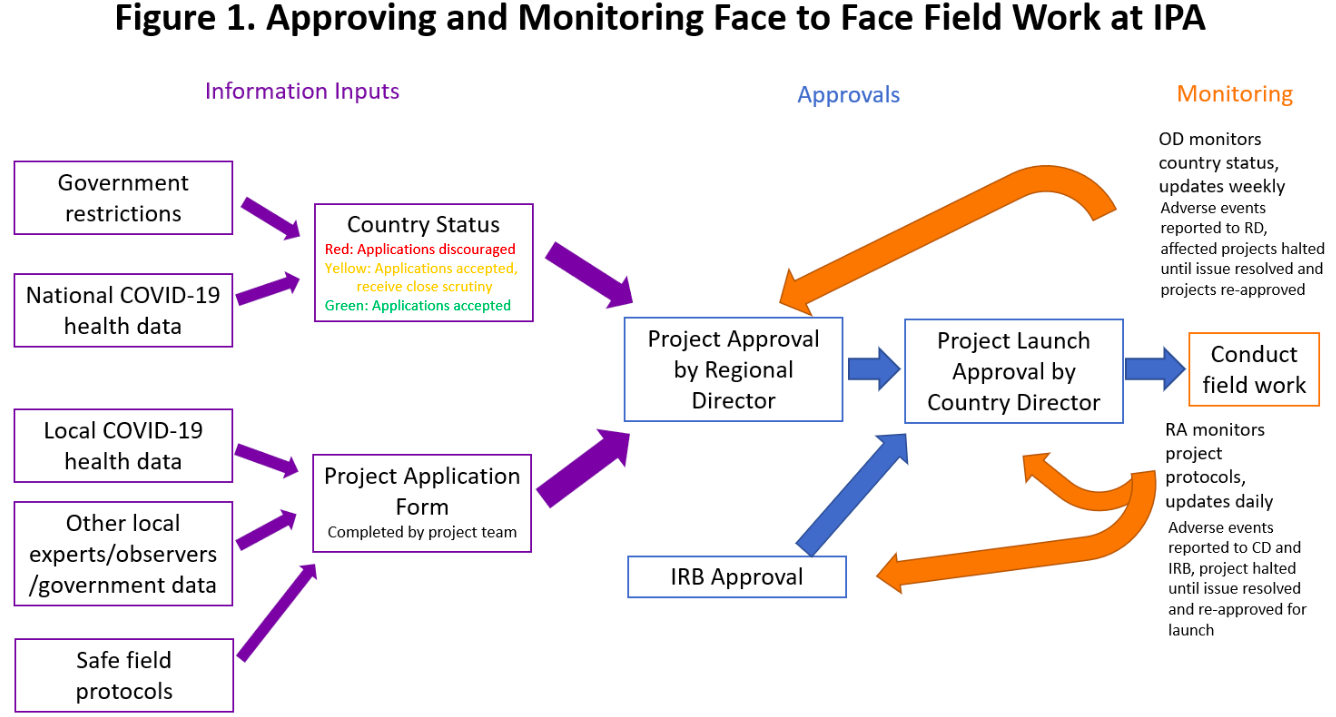IPA’s Cautious Approach to Restarting In-Person Research
Four months after WHO’s declaration of a pandemic, many of us are putting on our masks, crawling out of our quarantine burrows, and looking around, trying to decide what we can and can’t do safely. IPA had over 200 studies in progress when our work came to a sudden halt. We quickly distributed phones and tablets to our enumerators before the lockdowns were in place so we could stand up virtual phone banks, provide remote training and supervision, and tool up numerous studies to be finished or initiated as phone surveys. This pivot has been progressing as well as we could have hoped, with many new lessons learned and new data collected. At the same time, however, we’ve spent the last two months carefully considering our eventual, safe return to in-person research, consulting with experts and stakeholders, and drafting and revising policies and procedures. The outcome is a new policy framework on restarting face-to-face data collection at IPA, which we are making public today.
Our first priority has been and will continue to be the safety and well-being of our staff and the communities where we work. Yet we still want to contribute meaningfully to the crisis response, and after careful deliberation and planning, feel we can do so in a responsible way. Our approach creates an approval and monitoring system that continuously uses the best available country, local, and project-level information to approve and, if necessary, pause or halt at any signs of potential adverse effects on staff or the public, and to resume only once the issue has been addressed and re-approval granted. This process is summarized in Figure 1, which shows how these information inputs are used to inform approval for a project to go forward.
To craft this framework, IPA’s senior leadership consulted with peer organizations, public health specialists, Institutional Review Boards (IRBs), research ethicists, IPA’s Scientific Advisors, and staff living and working in the affected countries.

Why are we doing this?
To contribute meaningfully to the crisis response.
We are prioritizing work, evaluating risks vs. benefits, that can contribute to the critical data and evidence needs of decision-makers, and for which remote survey methods cannot serve as a substitute. This would include data collection with large potential benefits—such as the ability to save lives—beyond the reach of mobile phones.
How are we doing this?
In a way that protects the health and safety of our staff and the communities where we work.
IPA has always faced risk in the work we do and will never operate in a risk-free environment. In the face of COVID-19, we have spent months gathering detailed data, expert opinion, and local knowledge to guide a safe return to in-person data collection where we believe the conditions allow for it at the local level. With input from many of you, we have been developing detailed procedures and safeguards designed to use the best available evidence to weigh and mitigate those risks and balance them against the benefits of fulfilling our mission to find solutions to global poverty, including immediate solutions to immediate problems. At the planning stage, every project must go through an initial project approval, where research teams submit a 16-point application to IPA leadership for approval. This application addresses areas of risk, mitigation, and assessment of benefit. Once a study passes through the approval process, before it begins we have an 80-point checklist for project teams to complete—think of it as similar to a pilot’s pre-flight checklist to ensure the team is trained and prepared. We will continue to update our protocols as the science on this novel virus grows.
When and where are we doing this?
We are starting to evaluate opportunities now, but we are prepared to pull back at any time based on the best available data and evidence.
The COVID-19 pandemic has cascaded from a health crisis into a humanitarian, economic, and education crisis. This is a time when data in low-income countries is sorely needed, but we need to be mindful of how we collect in a way that helps everybody.
We are evaluating opportunities in many of the countries where IPA has an office. The possibilities for safely collecting data in person are better in some countries and regions, particularly in sub-Saharan Africa than in others, like in Latin America.
We have developed a dashboard that tracks the latest quantitative and qualitative information to construct a risk profile for every country where we work. We update this dashboard at least weekly for every country and will provide context for our evaluation of risk, which is done on a project-by-project basis; taking into account subnational information, which may not be captured in the aggregate country profile, and the variance of the state of the pandemic within a country.
Our overall approach is to move slowly and be prepared to pause or stop right away.
In many countries and for many topics, approving face-to-face research anytime soon is very unlikely. We will continue to update our policies and procedures as we gather more information and evidence, and we will continue to prioritize safety throughout. We welcome input as we cautiously step forward into resuming in-person research.
Question or comments? Contact us.












